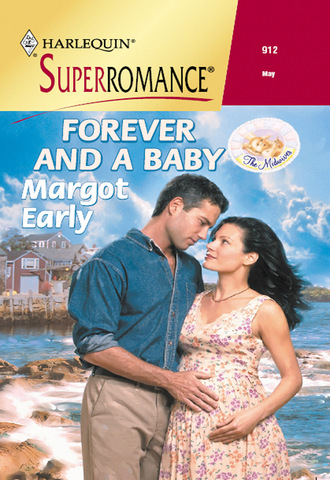
Полная версия
Forever And A Baby
Joanna slipped back into the room and sat on her heels beside her daughter. Dru loved the touch of her hand, the feel of each line. Joanna had slipped easily from the Velvet Underground to the Haverford ways. Now her daughter mourned with dance, and her mother remembered another, more difficult, loss. She hoped Dru would not have to grieve with the intensity she had when Turk’s boat failed to return, after the waiting, the waiting of a fisherman’s wife. But there were too many similarities.
The worst kind. Oh, my darling Dru.
Oh, sweet Turk. I never meant it.
Keri slipped to the floor with them.
Then one Haverford cousin in Calvin Klein stockings and Chanel.
The other in Armani.
They swayed back and forth and Dru saw Omar’s eyes and wept for the time they’d shared a bed. Too long ago. Months and seasons since they’d embarked on the plan for a baby. Why didn’t I say no? Why didn’t I insist on something different, Omar?
SERGIO OPENED THE DOOR, then pulled it wider. He smiled gently as Ben stepped in out of the biting wind. Sergio was whom he’d come to see, to ask a favor, to ask for clothing from a dead man’s closet. Ben explained why, as a nephew, as someone so close to Omar, and Sergio said, “I will send something to your home later today. It should cause no distress. Rather the contrary. You’re in ’Sconset?”
“Yes. Thanks.” How well-mannered these people were. His tribe and their servants.
The dogs were loose and found Ben. He petted Ehder, whose brown eyes begged for his heart, while Femi caught his shoelaces like a puppy. Ben listened to the ceiling and knew he would not see her.
Better that way.
Standing, he spotted a blond man in the hallway, hands on the top of a door frame, a man too big and rough for this home. He was smiling at a pregnant woman, the only woman. The others must be upstairs, ringing those tambourines, beating the drums, sawing on a one-string box. Knowing Tristan by his scars, Ben felt new amazement that once they’d all been small.
Tristan saw him.
Under the singing and playing and clapping, the people downstairs parted. Roger, the fund manager, squeezed Ben’s shoulder as Ben walked past, intent on Dru’s twin. On Tristan, bound to him as she was.
The pregnant woman pressed her back to the vast hearth, leaving the men to meet.
Tristan cocked a sideways smile. He tried a fragment of Bedouin greeting, shrugged and used profanity instead. His specialty back then. Something different and intentional now.
Ben wished him well.
They listened to the sounds from above.
Tristan was the tallest Haverford in memory and did not offer his hand.
Understandable. “What was your catch?”
“Thirty-four thousand pounds.” Tristan worked his mouth, thoughtful. “We leave again tomorrow. Last trip of the season. Then we’ll fish for lobster down here.” Georges Bank.
“Out of Gloucester?”
“Oh, yeah. I’m heading back real soon. After I kiss my mother, my sister and my little girl goodbye.”
“You still own a boat here?”
“Still paying for it.”
Upstairs, the instruments stopped, and a door opened.
Ben nodded and left, feeling Tristan’s eyes on his back.
Outside, he crossed the stretch of brick that had turned so slick in the rain last Wednesday night, or maybe the dogs had sighted something and tried to run, or maybe Omar had tripped. His bodyguard had said, He went flying. Hit a concrete step.
Tennis shoes pounded the walk, running. Long strides. A hand whirled him around. Discolored, glaring scars. Turquoise irises and sea-black pupils. “Do you love her? Are you in love?”
Time crept by.
If not for the car and the cameras, Tristan would have killed him. A certainty. Instead, a clicking and whirring caught the swordfish captain breathing hard and the tall, dark journalist distant and removed. Protecting his sources and his story. Unafraid.
The next day, the caretaker of the cemetery found a heavy stone at the head of Omar Hall’s grave and another at the foot. An Armani suit that had belonged to the deceased lay over the grave, upon the earth, that someone less fortunate might take it.
He had been buried as a Bedouin at last.
TROOPING DOWN the spiral stairs, wooden stairs, one of the Haverfords, Anne in Chanel, asked Dru, “Have you seen the Blades? Didn’t you deliver their babies?”
Natural curiosity. Skye had died, and her widower, David Blade, had remarried. Dru had attended the births of his daughters. At sea. A sea the shade of green in the amniotic fluid that had spilled from Rika’s bag of waters, had poured out as her head was born. “Yes.” Rage—or something like it—flushing her. She wouldn’t discuss Rika Blade’s birth.
Why did I agree to help Oceania? What kind of midwife am I to agree to a birth I don’t want to do?
“I guess deaths in this family always make me think of her. Skye.”
Too warm in the stairwell. Should turn down the heat. All the bodies.
“Didn’t you go to Africa with Skye? And stay with Ben and his father?” The name slipped in so casually, with no extra emphasis. Though everyone knew. About her and Ben. “Something happened. No one would ever say. How did Tristan get those scars?”
“He chose them. He should tell you. In the desert, things always happen. Many things happened.” And changed the course of Dru’s life, every choice she made with a man. “I miss Skye.” But her sick warmth intensified, and she pressed Anne’s hand and went away, hurried through the house and out to the garden to hide between the blue spruce and the pine, to crouch there in her heels, with her head in her hands, until Ehder, the blue brindle dog, came to kiss her, to sit nobly, knowing Omar was dead.
LATER THAT DAY, Tristan returned to Gloucester—and to sea.
Oceania and the paparazzi stayed.
Dru and Oceania ate dinner in the room where she’d listened to Omar philosophize through hundreds of perfectly prepared meals, where she’d helped entertain his guests. Afterward, Dru showed Oceania to her room. She brought a photograph, a writing tablet and pen. Oceania touched the nubby bedspread, old-fashioned and simple and fine. The room was open and white, like the others. Spare.
As Dru sat on the bed, too, Femi followed her in and sniffed at Oceania’s sweatpants and the huge sweater covering her belly. Oceania petted the sand-colored dog and bent for a kiss. Dru met her eyes. “Tell me if you want her to leave.”
The pregnant woman shook her head of dreadlocks, burnished by the sun.
“I want to ask you some things.” Dru wrote her first question. For the Baby: What are your plans?
Oceania’s script was small, upright, meticulous. I will keep my baby.
Do you have a place to go?
Yes. I can get there. No worries.
The rustling exchange of paper.
Wouldn’t you prefer to have your baby in the hospital? Don’t worry about the expense. They will cover you.
Oceania stared. She shook her head violently. Scrawled You said you would do it. Here!
Dru’s throat dried up. Almost four hundred births as primary attendant. Then…Omar. The Blades’ babies at sea and another birth, the birth from which she’d fled. Holding back the fullness in her throat. What she’d left behind. Maybe for the better. She wrote, I am a certified nurse-midwife with an MS in Nurse-Midwifery. Hand shaking, she added, I saw you at Gloucester Marine Railways with this man. And showed the photo.
Oceania was slow to take it. Short nails on those brown hands, on the fingers that gripped the pen. Hesitation. Who is he? Their hands touched, warm, as she thrust the pen back to Dru.
Oceania would lie about this. Dru saw it, felt it.
She wrote, My father.
Oceania’s lips opened, then closed. She wrote, and the dog’s ears twitched at the sound of pen on paper. Not the same person. Like, but not same. Tom Adams takes cod from Bedford, Nova Scotia. I’m from there. He’s family. I’m going back.
The bottom of the sheet.
The end of Dru’s questions.
Was it her imagination that Oceania had lied?
As Ehder, the blue dog, came in and sniffed the two women, Dru studied the photo. Wrote one last comment in a spot of white. I miss him. She ripped out the page and turned it over, furious now. His boat sank on Georges Bank, they think. In 1983. I was 14. I loved him. T. loved him. He taught us to maintain the boat. We helped with the catch. I want him back. She was wild, wanting Omar, too. Wanting someone else even more, despite everything the wanting made her feel. Those months that she’d traveled, searching for the right father for Omar’s child, were friendless months. Finally, she’d made one friend.
She wanted that friend now, more than she wanted her dead husband, whose wishes had confused her. Who had wished her to make love with another man, who had hit upon that method for them, for her and Omar, to have a child.
Oceania contemplated a tiny watercolor on the wall, a fisherman hauling in a net of squirming fish, no long lines or drift nets. With her tablet and photo, Dru stepped around to meet her eyes. “Good night.”
Outside the door, she trembled, nearly certain.
The man with Oceania had been her father.
THE CARETAKER CALLED before eight o’clock the next morning. Sergio told her gently about the grave, and she nodded, hugging herself, and retreated to her bedroom. Knowing Sergio must have given him the suit.
He was on island.
She stared from her windows, hoping not to see him.
Hating herself for hoping she would.
DANIEL MAYHEW, Keziah’s father, had handled most of Omar’s domestic legal affairs for twenty years. He was the executor of the will, and he phoned Dru in the morning two days after the funeral. “Would it be possible for you to come down to my office at, say, eleven?”
She blinked at her gray reflection in the gilded bedroom mirror. “You can’t come here?” Never, never, had they gone to Daniel’s office. Reasons for the change occurred to her. None made sense. Even if Omar had given everything he owned to charity, except for a box of tissues for her, why should…? There was no need for a dramatic reading of the will. Did people even do that anymore? Executors simply notified the beneficiaries. And Omar’s will was in a trust. No probate, no courts, no publicity.
“If another time would be better…” Daniel cleared his throat.
The police chief, who had liked Omar, had finally dispersed the paparazzi, escorting them off-island. Nantucket was quiet, its aim to still the passing of time. Its cobblestone streets and gaslight street lamps clung to a bygone civility. Paparazzi were unwelcome.
Still, Mitch should drive her. It was one thing she’d loved about being married to Omar. That she was always guarded. In some way. Even when she’d thought no one was there. Can’t think about it, can’t. Only think about Oceania and her baby. Not just get them the things they need. Must follow her when she leaves, can hire someone to do it, in case that man really is…
“I’ll be there.” Her voice dragged, and she heard in it not only the grief of a widow but the assurance of an heiress.
THE OFFICE WAS on Main Street, with a bicycle locked to a gaslight-style street lamp outside. As Mitch pulled the Mercedes to the curb, Dru rubbed Ehder’s silky fur and kissed his face. Femi next.
When Mitch came around to get her door, she took the dogs’ leads, braced their bodies to keep them from leaping out first.
Her driver smiled. “Want me to walk them?”
She’d planned to take them inside, a response to being asked to come to the office. But it really was rude. And presumptuous. What had happened to her? “Thank you.” Fingers wrapped around each dog’s collar, Dru stepped out, then let them follow. “Ehder, sit.” Lifting her hand, signalling him. “Sit. Femi.” She worked the dogs, ignoring her watch, before handing the leads to Mitch.
Ornate iron railings flanked the steps of the law office. She wore low heels and a dark gray suit designed for her. The silk lining slid against her thighs, smooth as the light makeup on her skin. Soon she’d return home and wear the face she wanted. At home, she’d make sure Oceania and the baby had everything they needed for the birth and afterward. Nice things. She would care for the mother, then lie in bed and gaze into her soul at what she’d done and decide how bad it was.
The door chime tinkled as she entered.
The receptionist had already reached Daniel’s walnut door. She knocked discreetly before opening it. “Mrs. Hall is here.”
He’s with someone.
Her stomach jumped. What now?
Daniel guided her inside and closed the door after her. And there they were. Three. Tabloids would give tens of thousands for this picture, as they had for photos of Dru Haverford Hall in Gloucester, leaning toward, submitting to, so obviously wanting this man.
Her husband’s nephew and her own cousin.
His presence could only be some retribution beyond her ken. Her heart began the stages of breaking. Exactly what she deserved. “Hi, Ben.”
CHAPTER TWO
From 1978 to 1981, my father and I lived in the Sudan, between the ‘Atbara and Gash rivers, with a group of Rashaida, nomadic Bedouins whose ancestors had crossed the Red Sea from Arabia in the nineteenth century. With our guests, our cousins, we set out in our Land Cruiser to rejoin them. The vehicle had no mirrors and no left rear window. Desert sand, which is dust, had collected several inches thick in parts of the back. The wind and rain came in and moulded a small desert. Skye had brought her own mirror—two—but she didn’t like the sand or wind or wearing long pants and long sleeves in the heat. “What do you mean this isn’t hot? Was that a joke?” As the sun fell on the primitive track leading southwest from Kassala, I saw the dust rise, as it does in the desert, back-lit by sun, like steam swirling off a hot pool. Minutes passed before we met the other vehicle, a faded green Land Rover, and stopped to converse with the Americans inside, one of whom took out an Egyptian-made assault rifle and aimed it at my father. “A fall cannot occur without potential energy.”
—Ben, recollections of an early fall
Gloucester, Massachusetts
One week earlier
October 16
SOMETIMES, WHEN SHE was waiting—for food or visa stamps or bureaucracy at border crossings—Dru counted days. She had left her husband in Nantucket to fly to New York, then Paris, and on to Bamako, Mali, 218 days earlier. Between that day and this, she and Omar had spent thirteen days and eight nights together.
She had decided to tell someone.
Everything.
Tristan. She could only tell her twin. She couldn’t tell Keziah. Keziah would have an opinion about what Dru had agreed to do for Omar, for both of them. Tristan might have an opinion, too, but it would be like hers, as though they owned the same head.
In their language, he might say, Surfside, which meant the apartment where they’d lived with their mother after the Tobias Haverford House was sold; Surfside meant better than a tent and worse than a boat. Here in Gloucester, Dru would jump on his back like a kid. Here, no one knew the person under the faded blue, almost gray, sweatshirt hood, behind gas station sunglasses, her brother’s cast-off chinos cinched at her waist with a canvas belt.
But the Sarah Lynnda wasn’t in port, nor her captain. Not for another week.
Dru would wait. Life had resigned her to watching the sea, knowing that fishing killed more men than any other job. A solemn fatalism prevailed.
Still, she loved Gloucester, the locals, the dingy Inner Harbor. She watched chain and gears haul a boat, an elderly dragger, up the railway and down through the brick archways to a subterranean pit. A cup of coffee warmed her hand, steamed in the air. A couple came from the docks. No. A man and his grown daughter, a white woman with dreadlocks. Pregnant and carrying in front, the baby already dropped.
Dru refused these thoughts, chose others. What would it be like never to comb her hair? She imagined charity auctions, benefit balls, state dinners…. Yes, yes. Her reverie broke. The man. She studied his face, the fall of his gray hair. His cowlick. Just a ghost, a doppelgänger.
But Dru walked closer, could not help it. Because of the cowlick. His hair riding up just that way on the right side of his forehead, his bangs drooping on the other side. She had to know that it was an illusion.
Not.
Not.
He hugged the young woman, who turned and flashed him a peace sign. They hurried off in opposite directions. He went toward the docks. Dru lost sight of him behind a truck.
She searched frantically. Was it him? Did I really see him?
But the man was gone.
She landed in the present, in the facts of her life that remained the same even under a bleak sky, beside a bar with a barn-red exterior. The fact that she must go home sometime. What to tell Omar. What to say to Omar. What to feel toward Omar. What to ask Omar. Dru pushed back her hood. The plan was over. She had scrapped it. It was no more.
No longer would she wander the world searching for the Appropriate Man. She’d made up that name for him. She couldn’t call him the perfect man or the right man. Omar was those. She’d wanted Omar’s baby. That’s all I have to tell him. Again.
When her father’s boat was lost, she’d learned the nature of expectations. A baby was not a right. Period.
She held her hand to her forehead. Did she value her marriage to a man who’d suggested she have sexual intercourse with someone else in order to conceive a child? It was because of that bicycle accident in Utah, that terrible fall. At first, she’d accepted Omar’s plan, knowing she should feel gratitude. She’d planned her quest. She’d gone. First to a place where she’d meet no one but the others on her guided tour. Seeking the notoriously inaccessible. Tumbuktu.
On the Niger riverboat, packed by class with desperate humans, Dru—desperate in her own way—had admitted that she hadn’t come to find a man but for other reasons. She’d come in search of the Tuareg. She believed Nudar had been one of those nomads. And while her group camped among the Tuaregs of the Niger, a woman went into labor. Dru knew no Tamashek, but enough French to say more than sage femme. Yet Rika’s birth at sea had returned. With anger. Why must Raisha, the Tuareg mother, have no option but childbirth in a skin tent? Dru touched the cowrie-shell fertility pendant that hung beneath her shirt. The marabout had said, You must see that you’re afraid. No, Dru wasn’t afraid to practice midwifery. But her reasons for giving it up—the paparazzi, such rude intrusiveness, the lack of privacy in the life of Dru Haverford Hall—would be incomprehensible to the marabout. Dru hadn’t dared say, My family fascinates Americans because we appear unlucky. And I fascinate them because my husband is richer than all the rich men in West Africa put together. She couldn’t hope to make a woman who’d never traveled further than Bamako understand. She hadn’t stopped practicing because of meconium in Rika’s bag of waters. Despite a master’s in nurse-midwifery and 400 births, her own family’s notoriety and Omar’s wealth were enough to keep Dru from midwifery.
From Timbuktu, she’d rushed home to find Omar absent. He couldn’t get away from Curaçao, must fly directly to Hong Kong.
Dru had left again, taking the dogs. To meet a series of men, a long line of men, and she’d ended up fiddling with her earrings or her hair or trying not to yawn. Then Key West and that bar…The carpenter she’d thought was cute reeked of Cuervo and they had nothing in common, and he kept talking about her body and how he liked her hips, how she wasn’t “a stick” and he liked a woman with some meat on her. Meat. She’d also worried that he was unintelligent, then hated herself for her prejudice. But she was selecting a father for her and Omar’s child!
Back to Nantucket—Omar for one awkward night, when she’d decided she knew what a condom felt like to a man because some invisible barrier had covered her senses, numbing her utterly. If you love me, she’d asked, how can you let me sleep with another man?
With reluctance. Because I love you.
He’d left in the morning on business. She’d said goodbye to the dogs and flown to Europe. A month in Paris, two in Scandinavia, sightseeing. Emotions absent. Back to Africa. Cairo and Aswan.
Morocco was ghastly, with all the Europeans in Arab dress. One man, a software CEO, had worn jeans and a canvas shirt, his hair in a ponytail. It was so close to completion, almost settled, and she couldn’t. Couldn’t begin to tell him the plan, couldn’t go to bed with him. He wasn’t her husband. That was the problem.
She didn’t want to do it.
She would tell Omar so. She was set to meet him in Nantucket soon—to stay—but first she needed this. To see Tristan. Have a beer and—
“Hi.”
She spun, the gears of the railway looming over her, high above. The cup fell, coffee running down the concrete.
“Sorry,” he said, folding the cup away in his pocket.
Him.
She had seen this man two months ago, at the camel market in Daraw, talking to a Rashaida sheikh. In Arabic. For Dru, in her circumstances, he’d been impossible to ignore. As now.
His hair was black, his build athletic. He wore a navy shell, thicker than a windbreaker. Brown eyes, almost black.
Nerves tingling, she backed away. Warm. Alert.
He stabbed his hands into his pockets. “I’m Ben Hall, your cousin.”
The Sudan stormed her senses, blasting memories.
“Omar asked me to look after you these past few months.” Sea-cold drowned the Sahara heat. A passing fisherman glanced at them, and she didn’t see. Look after her… He’d been following her? To watch her try to pick up a sperm donor?
And on the Niger…
No, it was impossible. Dru tossed her head back. “So where have you been?”
Whiskers coming through on his lean cheeks. “With you since New York, Paris, Bamako…” He closed his lips on Timbuktu. “We’ve been to Cape Hatteras and Key West and Greenwich—”
She held up her hand, stopping the recitation. Forget the problems of a woman traveling alone in Muslim countries. Greenwich had been a mistake, much too close to home. In her recklessness, she’d approached a lone and handsome man in the bar at the yacht club and said, I’m horny. I want to get laid. His mouth had tilted up on one side while he checked her out. Then he’d smiled tautly and edged away.
She’d realized she’d wanted him to, had said so with every word to the contrary.
Omar had provided a witness to her adventures, the one thing he’d promised not to do! She’d told him she couldn’t bear to have a bodyguard. Not for this.
She’d married him because she would have a bodyguard.
She’d married him for many reasons. And loved him because he was safe. And kept her safe.
Dru wasn’t going to ask Ben all he’d seen. “Well, your job is over, cousin.”
“You don’t remember me.”
“I do. How could anyone forget?” She shifted deliberately from the allusion to their past and what had happened in the Sudan. Everything that had happened. “My husband calls you ‘our young sheikh.”’
His mouth slanted.
Of course, that was an inherited title, wasn’t it?
“Maybe he thinks your father was a sheikh.” Flippant. Robert Hall was as unforgettable as the Sudan. And dead less than two years. “I’m sorry for your loss. Truly. And goodbye.”
He fell in step beside her. Faded jeans and running shoes. “I’ll stick close. Part of the job description.”
“I’ll bet talking to me wasn’t. It never is.” He was tall. Looking out for her. Maybe what bothered her was his face.
This unforgiving gray light had nothing to forgive in him.
A hot flush went through her, a stupid pheromone reaction.
She was scared. Scared.
The Sudan. The boy he’d been sometimes appeared in her dreams, although never in her nightmares of abduction.







